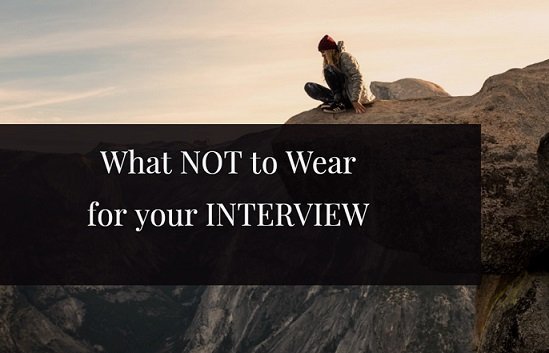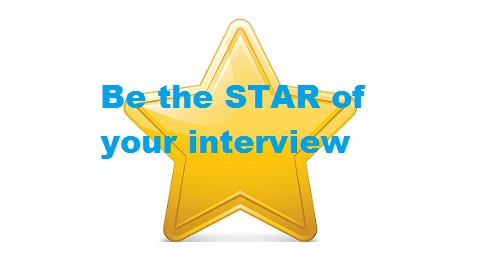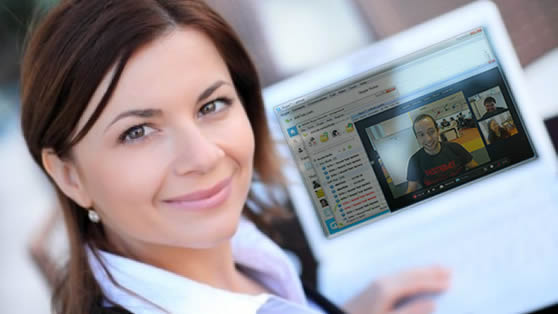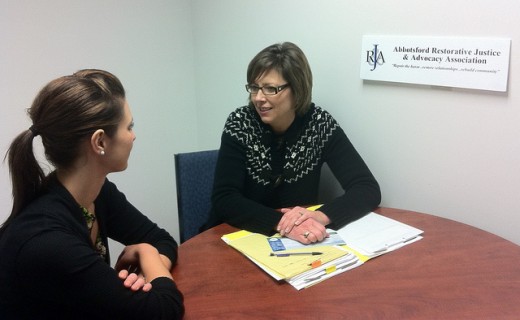In today’s dynamic job market, characterized by intense competition and limited opportunities, the interview phase holds immense significance. It serves as a critical juncture that can either propel or hinder your career ambitions. It acts as the doorway through which you introduce yourself, your abilities, and your potential to employers. [Read more…] about Top Interview Mistakes Job Seekers Should Avoid at All Costs
Interview Tips
5 Ways to Dress to Impress at Your Next Job Interview
Last updated : 1 December 2020
You may have gotten used to spending time at home for work or maybe you have been home trying to spruce things up a bit, and haven’t had to get out into the world lately. But the time has come to get back out there. Maybe you have been recruited or you have decided on your own that it is time to look for a new gig for yourself. With job changes normally comes an interview process of some sort. [Read more…] about 5 Ways to Dress to Impress at Your Next Job Interview
What NOT to Wear for Your Interview
Last updated : 27 January 2019
So you finally got that interview? Before you go have a quick look down this check list and just ensure you aren’t about to commit any of these interview dress SINS.
Some of them seem like common sense but you would be surprised how commonly some of them are committed!
It is very important to look good and smart for any job interview.
What NOT to wear for your Interview
Crumpled or Dirty? Whatever you wear for your interview should be CLEAN, and CREASE FREE. Try to put your clothing on just before the interview, don’t get ready first thing and then wear it all day, it’s bound to get stained or crumpled!
The wrong shoes!! Ensure you are wearing SUITABLE footwear. Sandals, Trainers, ridiculously high boots are all a BIG NO! Wear something sensible and suitable. If wearing dress shoes, ensure they are scuff free and shiny.
STINKER! Nobody likes someone smelly, so it goes without saying that you should be well groomed and cleans, but also don’t overdo it on the perfume/aftershave. The last thing the interviewer wants is to be able to taste your choice of scent.
Put away the accessories. If you have travelled in to the interview and been listening to music, ensure your headphones are tucked away into a pocket, likewise any hats/sunglasses/gloves should be tidied away before your potential employer lays eyes on you.
Hem line. Ladies, ensure that when you sit, the skirt you choose for your interview covers your thighs. If in doubt, a smart pair of trousers looks just as nice. Flashing leg may get you the job, but it may not be the right kind of boss!
TIED UP. If you wish to wear a tie, avoid novelty or gaudy coloured ties. You should choose one with a neat pattern or of solid colour, with experts saying red is a good choice for an interview.
HAWAII SHIRTS. In fact ANY brightly coloured clothing is a huge NO. Dress in a conservative colour scheme such as grays, blacks, browns. There are a few exceptions, for example if you are going to an interview in a nursery, you may wish to add a splash of colour in the form of a cardigan, just to show you have a fun side.
Unmatching Accessories. Ensure that any belts and shoes are the same colour and material or they will stick out like a sore thumb.
The wrong Bag. Don’t take a carrier bag, rucksack or similar to an interview. IF you must carry things in a bag ensure it is a business like bag, or briefcase.
Don’t overdo the Make up! This also applies to false tan. Less really is more. Don’t make your image look fake. If you must wear makeup ensure it is light and natural.
Avoid Jewellery. With the exception of wedding/engagement rings.
Tattoos/Piercings. These may be your pride and joy, but it isn’t a great idea to have them in your interviewers face. If you are concerned about the policy, ask at your interview about it. This will show that you respect their policies.
Unpresentable Nails. Ensure your nails are trim and neat, and clean! Ladies, don’t apply huge false nails for an interview.
Unpresentable or wacky hair. Ensure your hair is a natural colour and an acceptable style.
SOCKS! Men in particular should be sure to check their socks match their trouser colour, and that their trousers don’t ride up exposing inches of hairy leg!
Make sure before your interview that you have your clothing all ready to go, have a friend of relative check it over to ensure you look ok in it. Ensure that you feel comfortable in it. It would be wise to have two outfits ready just in case anything should happen to your first choice!
Why Using STAR Technique is Important for Job Interviews
Last updated : 30 January 2019
Using the STAR technique is a recognised way of communicating during a job interview. Interviewers are usually trained in this technique and how to adapt it to any interviews but mainly it allows for a more structured interview where communication and thinking before speaking are key. It is important to ensure that you try to apply this to each question you can so that your answer will be more structured and clear covering important answers for your recruiter.
STAR technique stands for Situation, Task, Action, Result.
Using the Star technique allows the interviewee to break each question down carefully thinking about an answer by following the STAR technique.
During the following examples, let’s focus on the following question – When did you have to work to a tight deadline and how did you overcome this?
S – Situation
This is the time to set the background of the question by explaining the situation that you were faced with – we were due to open a new store at short notice and needed to make sure that the merchandising was done quickly but in line with the new store area that we were unfamiliar with and who the target customers were and what they would like to buy to have a successful opening day.
T – Task
Explain the task, what did you do to achieve the task, how did you go about it, what effort did it require? – First of all we had to visit the local town and assess the other like stores and see what products were their best sellers to give us an idea of what sells in that market place and then we had to go through the stock we had at head office and decide what quantities, colours and styles of products should be in store for opening day and what promotions should be applied to make them attractive to new customers. We also had to plan the new store opening event to entice new customers to a store that they could possibly be unfamiliar with.
A – Action
The action that was taken to ensure that something was achieved – we divided the roles between the people with the best skills in our team so that some were allocating stock, some were working on point of sale material, some were liaising with the new store staff and Area Manager to ensure that the store has everything it needs for opening day including liaising with relevant IT departments for phones, till systems and pin codes, log on’s etc.
R – Result
The result, how it all panned out and what you have achieved and what you have learnt from the process that you have just been through to get to the end result – with all our planning and going through it all in meticulous detail meant that the store opened on time and we had a successful opening event with excellent sales figures and signed a number of customers up to our mailing list where we can invite them to other and new events that we do. Don’t forget that it was a team effort and that you can name who did what good and what less so and demonstrate how it has been thought out.
Top 10 Tips for a Successful Skype Interview
Last updated : 30 January 2019
With more companies working flexibly and employing people from different locations, there is a greater possibility that your interview with a company could be done over Skype so it is important to be flexible yourself when it comes to interviews and how companies want to conduct them.
Just like preparing for a face to face interview, it is important to prepare carefully for a Skype interview and in some cases more important as the interviewer is only meeting you over a screen rather than in person.
Some of the top tips to doing well in a Skype interview are listed below to help you prepare in advance.
#1 Dress the part
Make sure that even though you are not being seen in person that you dress appropriately for your interview. It may be tempting to wear your PJ’s as the interviewer will only be able to see your top half but by dressing the part for that interview means that you will not only look the part but you will also feel the part and it will give off an air of professionalism.
#2 Surroundings
Plan your surroundings and look around you, what can be seen in the background during your interview? It would not look good to be surrounded by chaos or have the TV on even if it is on mute. Make sure that you are in a clear and tidy position which is quiet and free from interruptions. Act like it is a physical interview.
#3 Rehearse
Just like you would a normal interview in person, make sure you practice your interview in advance. Practice your answers in front of a mirror or a friend/family member and although you do not know what questions you are going to be asked, by reading the job description and doing your research you can plan what some questions could be and what your answers would be.
#4 Smile
Make sure you smile and look friendly throughout your interview. Remember that your interviewer can only see you on a screen so it important that you look like a person they can work with and that you are easy to get along with. Smiling shows that you are personable.
#5 Crib sheets
Take advantage of the fact that not everything can be seen and have your crib sheets with your research and preparation around you so that you do not need to forget anything and can refer to these throughout the interview.
#6 Make sure the interviewer knows you are listening
Because your interviewer cannot see you in the same way, make sure they know that you are listening and make sounds of agreement etc to show that you are listening and reacting to what they are asking of you. Try not to talk over your interviewer though to show you are still there as this is very rude.
#7 Don’t ignore any technical issues you may have
If you have any problems with Skype, the connection or your computer throughout the interview, please acknowledge these and if necessary ask to make the call again and hopefully the connection will be better. If you pretend you have heard something and you haven’t it will come back to bite you later.
#8 Stay calm and talk slowly
Remember to talk calmly and slowly. Do not rush your answers so that it sounds garbled as you will come across too nervous and not clear. It is even more important to be clear in a Skype interview as that is all an interviewer has to go on, they cannot really see how you look and feel in person through a computer screen.
#9 Make sure you can use Skype
Practice in advance that you can use Skype well and understand how it works so that is avoids any embarrassment during your interview. Make a couple of calls to friends and family to ensure that you know exactly what you are doing and also what to expect.
#10 Show your interviewer that you are interested in what they are saying
You can do this by maintaining eye contact, sitting up straight and looking professional, nodding and agreeing as they are speaking. You need to practice looking into the camera to ensure that the interviewer can see that you are giving them good eye contact and not just looking into space or round the room.
Top 10 Tips for a Successful Telephone Interview
Last updated : 31 January 2019
Having a telephone interview is usually the first base to deciding if a company wants to take the interview process further and assessing whether you are what they are looking for. Many employers do a telephone interview first to gauge how you come across and whether they feel from talking to you that you would fit in and they can work with you.
It is therefore very important to come across very well and this is not as easy as it is to do in person as your interviewer only has the tone of your voice to go off before making their decision.
Some of the top tips that you can follow before your telephone interview are listed below as a guide.
#1 Take the call somewhere quiet
Make sure that you can hear properly and that there is no background noise such as the radio, TV, other people in the house etc. You do not want to be asking your interview to repeat their questions or what they said as that will be very awkward and could be seen that you are not concentrating.
#2 Use a landline if you can
If you are able to, try and use a landline as this prevents any bad connections, not having any signal or the signal breaking up. There is nothing worse than talking away and the other person couldn’t hear you or worse still the interviewer telling you about the role or company and you miss it completely.
#3 Have supporting documents in front of you to refer to
Because you are on the phone it means that you can have all your documents, CV, job description etc set out in front of you and then you can use these and refer to them throughout the interview. You wouldn’t be able to do this in a face to face interview so take full advantage of this and use whatever you need to so that you do not forget and can answer questions confidently.
#4 Smile down the telephone
It may sound silly but it is important to smile down the telephone. If you practice listening to your voice when you are smiling and when you are not smiling you can hear the difference so too will your interviewer so make sure that you smile where you can during your talking.
Prepare questions in your mind that you may be asked and how you would answer them.
Have some of the answers to potential questions written down so that you can refer to them. Practice like you would for a face to face interview and rehearse your answers so that you can tweak them once you have been asked the question as you cannot be a mind reader and know exactly what the interviewer is going to ask.
#5 Make notes
Make notes whilst you are on the phone so that you can re cap, go back to, notes of potential new questions that you would like to ask your interviewer. It allows you to be able to remember important facts about the job, the company and how you feel you would fit in.
#6 Ask questions
Do not talk over your interviewer but do ask questions. It shows that you are interested but if you are also able to ask questions related to the conversation you have had during the interview then this will also show that you have been listening throughout.
#7 Give examples that shows you have done some research into their company
Try and give examples that demonstrates that you have done your research well into their company and job role. Refer to their website for example or a case study they have done or something that someone has written etc. Go through company information that you can use with a fine tooth comb.
#8 Make sure you answer questions with a conversation element rather than a yes no answer
Try to have a conversational interview rather than being asked a question and giving a Yes or No answer. This cuts the conversation dead and will make the interviewer feel that there is no rapport and make it difficult to extract information from you which will have a poor result.
#9 Be friendly and professional
Be friendly and professional over the phone. Do not have a bad attitude or any poor attitude at all, they will be able to hear it all too well and that does not sound good.
Top 10 Interview Mistakes to Avoid
Last updated : 31 January 2019
No one wants to have a poor interview surely? But some people manage to make all sorts of mistakes when it comes to interviews and some of the mistakes will be very costly for the sake of thinking, concentrating and being logical about the end goal of having an interview.
Below are some of the blunders you most definitely want to avoid making.
1- Turning up late
Arriving late for an interview. This is really bad. It shows a lack of respect and enthusiasm and will leave your interviewer feeling like this is you natural attitude and if you are unable to be on time for an interview then it is unlikely that if you were employed that you would be on time for work each day.
2- Not dressed appropriately
You always must dress appropriately for an interview. You must always dress according to the company and look smart and as though you have made an effort. You do have to look at what kind of role you are going for though and do not turn up looking out of place so that your interviewer cannot picture where you would fit in.
3- Not reading the job description
If you have not read the job description carefully then you will not understand what they job entails and more than likely be unable to answer the questions that the interviewer is asking you. You need to know exactly what areas you can do of the job description and what areas you may need some training on so that you can deal with these during the interview.
4- Going to the wrong location
Not going to the correct location where the interview is to be held. Some companies have different site locations. It is important therefore to ensure that you know exactly where your interview is to be held and not just assume that it is the location that you are most familiar with.
5- Not knowing the name of the person who is interviewing you
Checking the interview details are very important and so is knowing the name of the person or people who are interviewing you. Make sure when you meet them that you acknowledge them by name so that they know you are paying attention.
6- Disagreeing with your interviewer
A massive no no. No matter what you opinion do not disagree or challenge your interviewer as you could come across as being awkward and argumentative and until you are working for their company you are only using your opinion rather than experience.
7- Not preparing and doing research
If you are not prepared for your interview and have not done your research then this will become apparent very quickly in the interview. Any interviewer who gets wind that you know very little will just assume that you could not be bothered to find out as you are not that interested and if you are wanting to get this job this is not a good way to work.
8- Not asking questions
If you do not ask questions then your interviewer will also assume that you are not interested. An interviewer has just spent a certain amount of time talking to you and telling you about the company and role and therefore from that it should have generated some questions. If you are nervous about not being able to think of any questions then pre prepare a couple that you could use in most cases to show that you are interested.
9- Not being able to answer their questions
If you are not able to answer a question then do not ignore this but address it appropriately and try to turn it round into a learning curve and a positive rather than sitting there being awkward and saying that you do not know. If you do not know an answer to a question, think why. Do you not understand enough about the role or the business? Was there something you could have done easily to find the answers?
10- Taking someone with you
Do not take someone with you to an interview, it shows a weakness and not what an interviewer wants to see. If you have some with you for example if they drove you, make sure they stay in the car or if they just came along for company leave them in the cafe down the road or make sure they stay outside and out of site as it does not look good.
Top 30 Questions to Ask During an Interview
Last updated : 31 January 2019
Questions in an interview vary greatly depending on the job that you are being interviewed for, the size of company, your experiences, the qualifications etc.
Below are the top 30 questions that you could ask during your interview:
1. What do your staff enjoy about working here?
A good question to ask and it gives you an insight into why people like to work for them which enables you to make a clear choice.
2. How often do you review your staff?
By asking this question it allows you to know that you won’t just be employed and left but that they have a review program in place to look at the development and progress of their staff.
3. When will you be making a decision?
You know how long you will be expected to wait for a decision to the next steps of the interview process.
4. What else can I show you about my experiences?
Allows the interviewer to tell you what else they want to know that maybe you have not thought of.
5. Can I see the job description?
Most interviewers will have the job description with them in the interview if you have not had it prior to the interview it is a good thing to ask to see it so that you know what the job entails and you know how to tailor you answers.
6. Can you describe the team to me?
Allows you to see if you will fit in and also for the interviewer to see where you fit. What are the different roles in the team and different skill sets.
7. What are the company plans for the next five years?
A good question to ask, shows that you are looking to the future and allows you to find out exactly what the company plans for the future are so that you know where you could fit.
8. Could you show me some examples of what you would like me to work on?
This allows you to see what you would be doing in this role, very important to assess if you are comfortable with this work or level.
9. What is the reason for the vacancy?
An almost expected question – is it a new vacancy due to expansion, has someone left and if they have why have they left?
10. What would you say are the three most important things someone needs to do this role?
It allows you to them demonstrate your skills in reflection of this to show you are that person.
11. What does a typical day look like in this role?
Breaks the job down so that you can get an idea about what you will be doing all day.
12. Do you offer any training?
Do you feel you will need some training? Are you keen to learn new skills? A good question to demonstrate that you are willing to learn new skills and to progress.
13. Do you have any concerns about me being right for this role?
This gives the interviewer the opportunity to share any concerns they may have and also gives you the opportunity to address them and hopefully clear them up.
14. How does the company communicate to their staff?
Gives you an idea about whether they have a lot of meetings, if things are communicated by email, face to face etc.
15. What challenges does your company face?
This makes the interviewer think about what challenges they have and also allows you to show any examples of how you could cope with these challenges if faced with them.
16. What do you look for in new candidates?
Are you that person, what do they look for, can you show that you are that person by what they have said?
17. Why do people leave your company for other roles?
A good question and allows you to judge what their staff turnover is like.
18. Is there a structured career path for this role?
Or will you be required to make your own path? Depends what you feel comfortable with. Some people can only work to structure and know where they are so it is important to understand how they work.
19. What challenges do you think I would face in this role?
Do you have a skills shortage in their eyes, would it be a learning curve to begin with? Gives you an insight into what you may have to learn.
20. What are the day to day responsibilities in this role?
Looks at what you will be expected to do on a day to day basis so that you can plan in your head how you would achieve this.
21. Are there any weaknesses in the department that you are looking to improve?
Can you demonstrate that you can fill that gap with skills that you have that they are currently classing as a weak area?
22. How would you describe your management style?
Open door policy or not? Do you feel that you could work to that kind of manager every day? Most managers have very different styles so it is important to know what you can work with.
23. How do my skills compare with other people that you have seen?
Gives you an insight into who they have seen and where they see your skills in comparison.
24. What is the next step in your interview process?
They may volunteer this information but if not it is important to ask so that you know what happens next.
25. What performance expectations do you have over the next 12 months in this role?
What are they looking for out of a new employee, how quickly are they looking for someone to develop and into what?
26. How long have you been in the company and how has the company changed?
Shows what they think about the company and how it has developed during that time. It could give you a look into the future development.
27. Are you looking to hire more people over the next year?
Are they recruiting more and growing?
28. How would you describe the company culture?
What is it like to work there? Gives you some time to think if it would suit you.
29. Can I answer any last questions for you?
Gives the interviewer the opportunity to ask anything that has come to mind during the interview and discussions.
30. Do you ever hold company events?
Will you be able to go, what kind of events do they run, for clients, employees etc.
How to Cancel an Interview
Last updated : 31 January 2019
Although it’s a strange concept cancelling an interview, it does happen and even though you may not need or want the job any more it is still important to come across well and because you want to remain professional and you never know when you could regret cancelling that interview and want to go back to the company in question.
Besides which usually there is no reason why you shouldn’t be courteous and pleasant about not going for an interview. It is certainly important not to burn your bridges as depending on your circumstances you never know when you may want to go back to that company.
The main ways of cancelling an interview are methods of communication as listed below:
If your interview was generated from an email you sent to a company and then they emailed inviting you to an interview, then it seems logical to cancel your interview by email following the same format.
The best way to do this would be to reply to an existing email so that the recipient can see the previous conversation and see quickly how it follows on.
Reply or Reply to All stating the reasons why you do not want to attend the interview and thank them for giving you the opportunity and sorry that on this occasion it has not worked out, however you wish the company all the best for the future.
Phone Call
Not everyone would feel comfortable doing this but again you need to follow the method of communication which has been used and by picking up the phone and calling the company to say that you need to cancel the interview then you know that there is no miscommunication and that you have definitely told them and spoken to someone and they know that you will not be attending and the reason why. It will also to help the company in going forward and finding another candidate.
Message
If you have to leave a message and this is the only option you have then at least make communication but be aware that for whatever reasons they may not get you message so I would always back this up with another method.
Letter
You could write a letter to the company or person that has invited you for an interview stating the reasons that you are not going to be attending the interview and that you would like to cancel the interview. Follow the same as email method and ensure that you are polite and courteous and ensure that you thank them for giving you the opportunity etc.
You may have to cancel an interview because of a conflict for example with your current employment and something that you cannot get out of. You clearly in this situation want to reschedule so it is important that although you have a specific reason for cancelling that you are as vague as possible and state that you have a conflict at the same time and is there any way that you can reschedule for another time/day etc.
If you would rather go to another interview rather than this one then make sure you reschedule this interview anyway as you never know, you may not get the job that you want and then it would be impossible to go back to the company that you cancelled the interview for.
Be respectful of other people’s schedules and cancel the interview as soon as you know you are unable to make it. This is especially the case if you are looking to reschedule as they are more likely to believe you and that you are showing you have tried to give them plenty of notice.
Make sure that when you are genuinely cancelling an interview that you do not give a huge life story or tale. Employers are aware that you have a life outside of work but they do not even know you yet and do not want a long tale about why you are unable to attend. Try sticking to the point as honestly as you possibly can and if you have got a new job before attending this interview and you want to stay in your new job, tell them so it does not leave them wondering.
Top Five Tips to Deliver an Impressive Presentation
Last updated : 31 January 2019
More and more interviewers are using presentations as part of their interview process – and it’s not just for those sales and retail roles! It’s a great way for employers to suss out how much information you’ve taken on board about the role, your understanding and also how you conduct yourself in unfamiliar territory. It’s also a great opportunity to really sell yourself and make the right impression. Here are my top 5 tips on presentations:
1. Follow Instructions
When you’re asked to prepare an interview, the employer will provide you with an overview of what they want to hear from you – whether that be information they want you to present or questions about the role they want to know your answers to.
If they give you a brief – make sure this is the focus of your interview! If you present information that doesn’t match up with what they’ve asked for, you’re already setting yourself up for a failure. Provide a friend with the brief and present to them – get them to tick that you’ve answered everything that’s expected.
For example, for a recent interview I was invited to I was ask to prepare a presentation focusing on 3 main questions – What my first month in role would look like, what activity I would be doing to generate my target & who would be my competitors in role. You can clearly tell the employer is looking to make sure I have a good knowledge of the role, the industry and that I’m realistic about the workload I’ll need to be doing to achieve my targets.
On the back of this, it’s also really important to think about the timing of your presentation. If the employer has given you 10 minutes – make sure your presentation is 10 minutes!
2. Structure & Format
It may be useful to speak to the employer about the expected format if you’re unsure. As I’ve mentioned in previous articles, never see asking for more information as a bad thing – it’s better to ask if you’re unsure and get it right, then guess and fail. Do they want a paper copy to read through or a PowerPoint presentation? One client interviewed recently for a Tutoring role and his presentation was to present a half hour lesson on his subject. Make sure you know what will be expected of you.
One tip I always tell clients is to think outside the box – get the company logo and attach that to your presentation slides, or have it as the background. Make sure your presentation isn’t word heavy and include pictures, diagrams and use the facilities on PowerPoint to try and make it as interactive as possible.
3. Preparation, Preparation, Preparation!
Possibly one of the things I can’t stress enough is BE PREPARED! If you leave it until the last minute to put something together, and don’t practice prior to the interview, it WILL be obvious to the employer.
Run through your presentation with friends, family, the dog or even to yourself in the mirror – film yourself and watch it back, look at your body language, facial expressions – all of these things will be scrutinised in the interview so make sure you’re aware of yourself.
Another good exercise is to think of any questions that might be generated by the employer on the back of your presentation – there are always follow up questions so try to think what might come out of the points you’ve raised. Be prepared to back up your ideas and statements!
4. Delivery
It’s common sense but worth pointing out that no one likes to listen to someone who talks monotone and sits perfectly still. As human beings, we’re interactive, we respond to things that interest and excite us – the same can be said for your presentation!
This is where your preparation will also come in – think about things like your pace – are you speaking too quickly, too slowly, too quietly? Are you running to time, or talking too much and going over?
Be visual, if you’re asked to stand up and present, move about the audience, make eye contact with everyone and don’t be afraid to make gestures, and be sure you have open body language (uncrossed arms, facing front, no hands in pockets!)
One of the things I’ve done frequently in interview presentations where I’ve been restricted on time, is to present information and pick out key points, making the point that I have lots more ideas I’d like to discuss and hope we get the opportunity to come back to at the end of the presentation. This has always worked nicely, as employers have picked up on this and focused their questioning around this.
5. Enthusiasm & Personality
Something I have spoken about many times in my articles on interview skills and something that ties in quite nicely with the delivery of your presentation is your enthusiasm and personality.
If you’re not enthusiastic about what you’re talking about, why would the interviewer be? This is an exciting opportunity for you to sell yourself and talk openly about the role and your skills/knowledge. It’s a chance for you to lead the interview, invite questions from the interviewer that you’re fully prepared for based on your interview and demonstrate your knowledge and expertise.
Do your research and be prepared to think outside the box a little – the employer may well have seen multiple candidates who’ve presented fairly similarly, think about what you can do to stand out from the crowd.
Presentations can be a daunting task but put a positive spin on it – It’s a fantastic opportunity for you to set yourself up for the remainder of the interview and a great chance to present YOU as well as the desired information.

















